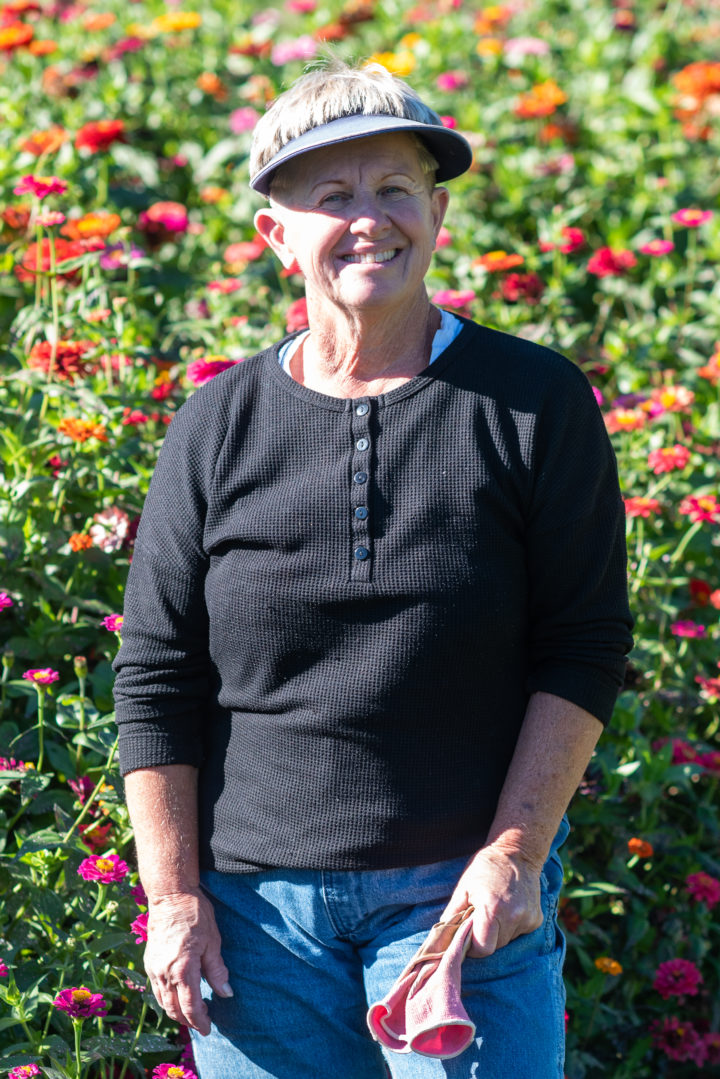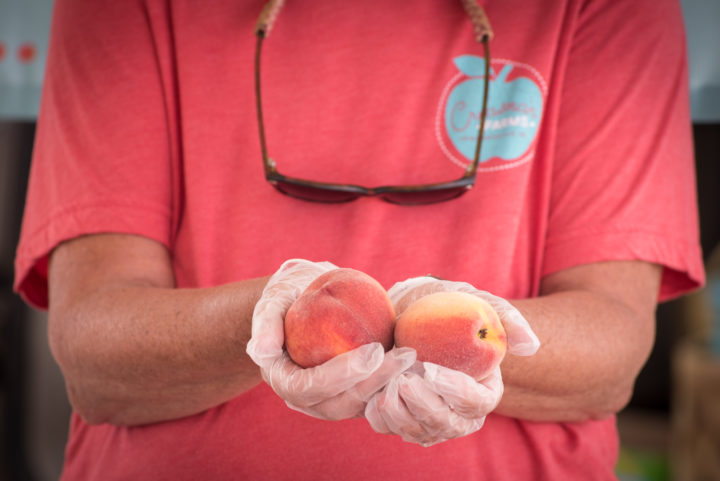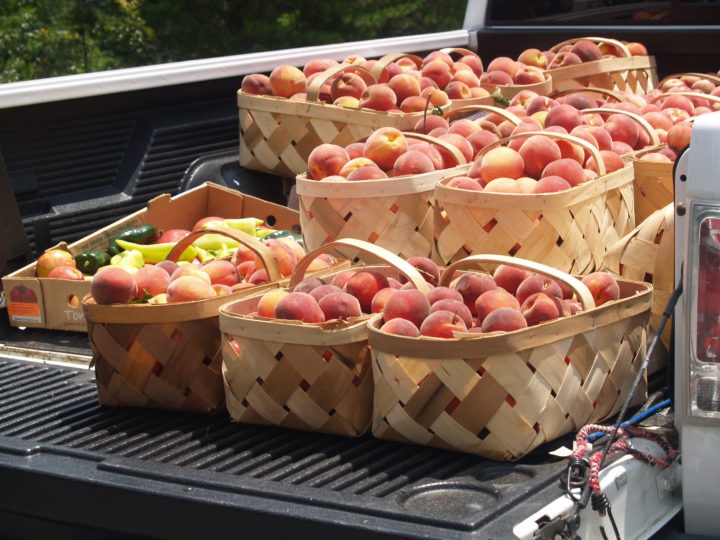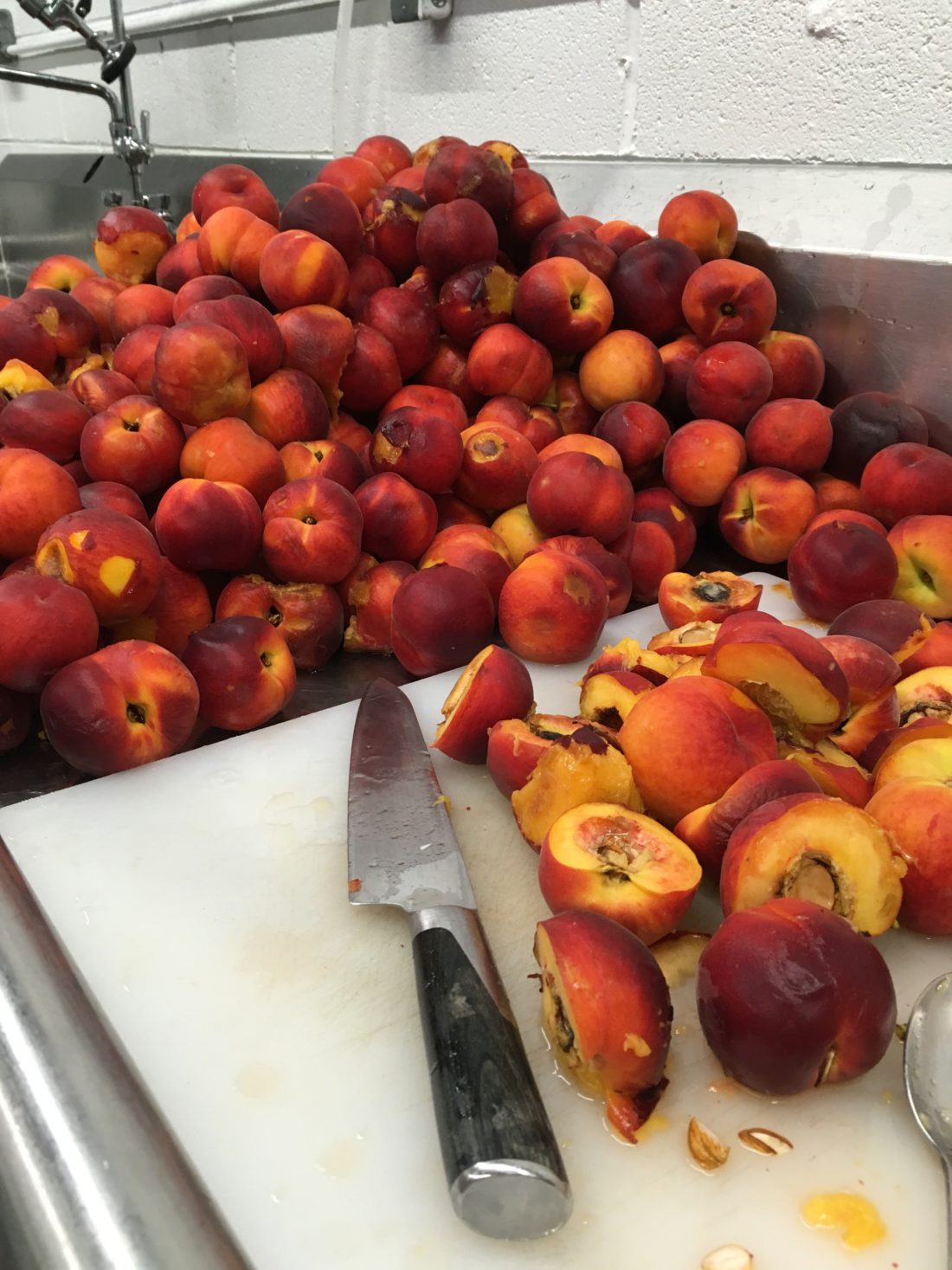A series of April freezes devastated the peach crop in WNC and beyond, and the resulting shortage will affect more than your grandma’s cobbler.
WNC farmers are left with bitter losses — 90% for peaches in Henderson County alone, amounting to $600,000 in lost revenue, says Terry Kelley, tree fruit expert and director of the Henderson County cooperative extension. That compares with an 80% loss in Georgia and 50% in South Carolina from the same warm winter-cold April combination that was lethal to the iconic Southern stone fruit. (Despite its Peach State nickname, Georgia grows fewer peaches than South Carolina.)
Fruit farmers hope they can recoup deficits from peach season with later-blooming pears, apples and berries, while local producers of peach jams, sodas and pies may have to look farther afield for their peach supply this year, leading to higher prices for lower-quality fruit. The shortage also affects locally focused produce distributors and farmers markets that depend on the foot traffic that peaches attract.
“When a crop that is so iconic [in the South] like a peach, has a failure in a region like ours, it means prices for local peaches are going to go up. [That] means all the businesses that rely upon them, either have to jack up their prices, eat the cost, or go elsewhere for product,” says Noah Wilson, director of sector development for Mountain BizWorks, who sits on the steering committee for the Asheville Area Food Guild.
For farmers in more southern areas, peach trees didn’t get a required number of chill hours this winter — below 45 degrees — to set fruit. In the more northern peach-growing areas, like WNC, the late freeze devastated peach blossoms that were already developing fruit after a warmer-than-expected February, Kelley says.
The resulting higher cost for fresh peaches means less profit from some local brands’ signature offerings, like Waynesville Soda Jerks’ peach soda and Baked Pie Co.’s peach pie, and local distributors are left searching for the iconic fruit farther from home.
When brands and suppliers have to reach beyond growers in the immediate region, it affects the entire community, says Appalachian Sustainable Agriculture Project’s David Smiley.
“It drains the community pool that we all rely on being quite full for living healthy, productive and happy lives here in Appalachia. Supporting your local farmer keeps money in our community, and inversely, when crop failure occurs, it can often be a missed economic opportunity and fortifier for farmer and community alike,” says Smiley, program manager for ASAP’s local food campaign.
On the farm

At KT’s Orchard and Apiary in Haywood County, the April freezes left farm namesake Kathy Taylor with only two of her 500 peach trees with harvestable fruit. That means no peaches to sell directly to the public and a limited harvest suitable for wholesale accounts.
“When you get [peaches], it takes care of a lot of expenses because it’s your first crop. And then you have some breathing room to save some money with your apples. But when you lose a crop, any crop, that hurts,” Taylor says.
This year, that same late freeze hurt her apple crop, leaving her with less than half of her typical apple production, she estimates. That means the pressure moves to KT’s pear trees, which fortunately are at prime fruit-bearing stage, to make up for lost peach income, she says.
“You know, any farmer that loses a crop, if they are dependent on it, it’s a hardship. In turn, you try to find another crop that you grow to try to help take its place. So you know, this year we have pears. It’s not that pears are as popular as peaches, but we do have some pears this year. It won’t completely take the place of peaches, but it will help.”
In Henderson County, Dawn Creasman says she has experienced about a 60% loss in her peach crop on Creasman Farms.
They have managed to scrape together enough to make a couple of runs to Asheville City Market in June, but Creasman warns that supply is low and peach lovers should get to the market early to get the Southern delicacy.
In Franklin, after three straight years with a minimal peach crop because of weather complications, about 50% of J.W. Mitchell Farm’s peach trees produced this year, estimates market stand employee Tori Queen. That’s not enough to allow customers to pick Mitchell’s biggest fruit crop in the orchard themselves, but the farm should have some supply for the farm stand and some wholesale accounts, she says.
While the down year for peaches hurts farms’ bottom lines, these days, it’s not terribly uncommon, notes Kelley.
There weren’t that many peaches in the mountains 25 to 30 years ago, but more cold-resistant varieties have come on the market recently, leading to more farmers taking a risk on them because of their popularity and the prices they garner at farmers markets, Kelley says. However, warm winters and late freezes are not uncommon in WNC, making peaches susceptible to significant crop loss, he adds.
Peachy products
In a region where local businesses value keeping their money close to home, the economic hit of a down peach crop doesn’t end with farmers.
Waynesville Soda Jerks co-owners Megan Brown and Chris Allen freeze peach juice sourced in the summer so they can produce peach soda, one of their signature flavors, year-round. While soda currently on shelves was sourced from KT’s Orchard last year, they’ll start working on finding this summer’s peaches in the next month or so.
“When we get to sourcing peaches for this year, that’s where we may hit an issue with a lot of the farmers having frost in the spring,” Brown predicts.
Brown and Allen do their best to source all their fruits as locally as possible, but because of the precarity of the North Carolina peach season, they have to stretch their sourcing to South Carolina and Georgia some years.
Going to a local or regional distributor for products increases costs for businesses shopping for produce, leaving them with two options: eat the cost or pass it on to customers.
After 10 years electing to eat the increasing costs of fuel, bottling and fluctuations in produce costs, Brown and Allen are increasing their prices for the first time this summer.
At Copper Pot and Wooden Spoon in Waynesville, Jessica DeMarco stays flexible, adapting to the whims of the weather year to year in sourcing for her specialty jams and pickles. If a particular fruit is more expensive because of supply limitations or having to source from further away, she says she might change how she sells one of her jams.
“If the price is just too high on [something], we won’t make as much of it, we’ll just sell it direct retail, and we won’t offer it wholesale to other stores,” she says.

Kirsten Fuchs at Baked Pie Co. in Arden has already seen her peach pie season delayed from late June until at least mid-July because of a lack of fruit from her main supplier, Creasman Farms.
The less the fruit has to travel, the fresher, and therefore more flavorful it is, she says. If she has to expand her source range deeper into South Carolina, it will be more disappointing than economically impactful to her business, she says.
While some small companies can pivot because of their diverse offerings, when money is spent on farm products outside the area, the more than 850 family farms in ASAP’s Appalachian Grown region — within 100 miles of Asheville — feel it, Smiley says.
“These farms are your neighbors, your children’s classmates, they are dining at your restaurant, they are attending your concert, and in turn, money spent with local farms is spent with all of us,” he says.
An alluring fruit
Ron Ainspan, founder and owner of local food distributor Mountain Food Products, says the limited supply of peaches in WNC and upstate South Carolina has forced him to look for peaches as far away as Columbia, S.C. That’s outside the region ASAP defines as local, which means the product will cost more and won’t be as fresh, he says.
Ainspan predicts the cost for peaches this summer could as much as double at the WNC Farmers Market, where Mountain Food Products is headquartered. That high cost and low supply will reduce traffic at the market and impact everyone.

“Peaches are a really important crop to this area, and particularly to the activity out here at the farmers market. If there are peaches, people will come here for those and a lot of other things. And if there are no peaches, it really reduces the traffic out here. So that means buyers aren’t coming in, and that means suppliers aren’t bringing them here. So it really has a significant impact on the supply chain,” he says.
Farmers get more profit selling produce directly to consumers at farm stands and farmers markets, so they will likely prioritize that customer base for what peaches they do have this year, further limiting what’s available to a distributor like Mountain Food Products.
Fortunately, Ainspan says he doesn’t expect a major financial blow to his business, mainly due to the creative problem-solving nature of his main customer base: chefs and food service professionals.
They’ll shift to using what’s available, like blackberries and blueberries, he says.
Regardless, fewer peaches on the farm means fewer peaches at market, in stores, on restaurant plates and in specialty items, and less money in everyone’s pocket. That means a less secure food system, Smiley says.
Fortunately, agencies like ASAP and the Asheville Area Food Guild are helping to connect farms, businesses and consumers to provide economic insulation from the notorious unpredictability of mountain weather.
“A strong relationship between farm and buyer can help weather both metaphorical as well as literal storms, allowing for both farm resiliency as well as improved quality of product,” Smiley says.
Relationships aside, nothing impacts farms and farm-reliant businesses like unpredictable weather, something Taylor knows she’ll battle in her orchards every season with increasing frequency.
“You gamble every day of your life being a farmer,” she says. “Things happen. I think we’ve always had things happen. But it seems like our weather pattern is more unreliable now than it’s been in a long time.”




Before you comment
The comments section is here to provide a platform for civil dialogue on the issues we face together as a local community. Xpress is committed to offering this platform for all voices, but when the tone of the discussion gets nasty or strays off topic, we believe many people choose not to participate. Xpress editors are determined to moderate comments to ensure a constructive interchange is maintained. All comments judged not to be in keeping with the spirit of civil discourse will be removed and repeat violators will be banned. See here for our terms of service. Thank you for being part of this effort to promote respectful discussion.